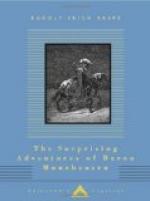Taking Reinhard’s solemn asseveration in conjunction with the ascertained facts of Raspe’s career, his undoubted acquaintance with the Baron Munchausen of real life and the first appearance of the work in 1785, when Raspe was certainly in England, there seems to be little difficulty in accepting his authorship as a positive fact. There is no difficulty whatever, in crediting Raspe with a sufficient mastery of English idiom to have written the book without assistance, for as early as January 1780 (since which date Raspe had resided uninterruptedly in this country) Walpole wrote to his friend Mason that “Raspe writes English much above ill and speaks it as readily as French,” and shortly afterwards he remarked that he wrote English “surprisingly well.” In the next year, 1781, Raspe’s absolute command of the two languages encouraged him to publish two moderately good prose-translations, one of Lessing’s “Nathan the Wise,” and the other of Zachariae’s Mock-heroic, “Tabby in Elysium.” The erratic character of the punctuation may be said, with perfect impartiality, to be the only distinguishing feature of the style of the original edition of “Munchausen.”
Curious as is this long history of literary misappropriation, the chequered career of the rightful author, Rudolph Erich Raspe, offers a chapter in biography which has quite as many points of singularity.
Born in Hanover in 1737, Raspe studied at the Universities of Goettingen and Leipsic. He is stated also to have rendered some assistance to a young nobleman in sowing his wild oats, a sequel to his university course which may possibly help to explain his subsequent aberrations. The connection cannot have lasted long, as in 1762, having already obtained reputation as a student of natural history and antiquities, he obtained a post as one of the clerks in the University Library at Hanover.




